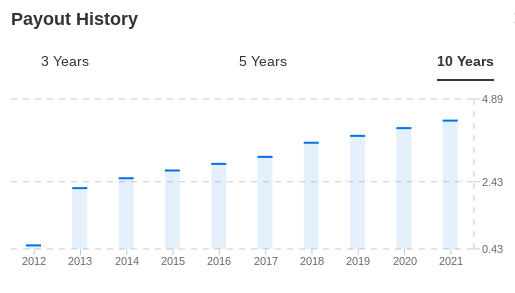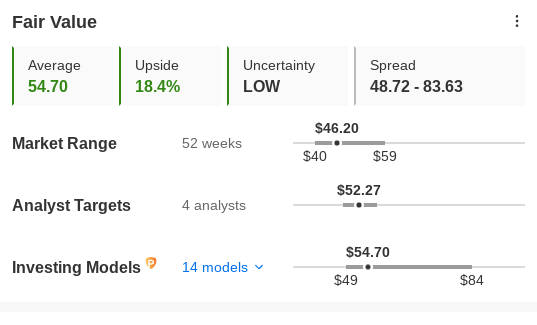- High-quality dividend-paying stocks provide income stability during times of economic distress
- Large companies that have a long history of paying dividends can weather an inflationary environment better than other asset classes
- Companies with strong cash flows that consistently grow dividends by 5% to 10% every year are generally suitable for a long-term portfolio
The current economic environment has made saving for retirement quite challenging. Whatever extra income one could spare is being eaten up by higher inflation and rising mortgage costs.
However, while 2022 could be the worst year for stocks since 2008, long-term investors must use this opportunity to build solid portfolios with the potential to earn solid passive income.
A challenge beginners face is finding reliable stocks that continue to pay dividends in both good and bad times. One way to make it easier is to diversify and buy stocks with low betas—equities that are less volatile than the overall stock market.
These stocks will still fall during a severe market downturn, but their moves will be less dramatic than those of high-growth equities. They will also rebound quickly when a market correction occurs. Such stocks would include power and gas utilities, telecom operators, and food companies.
Here are two such dividend stocks from this group to provide you with an idea of how to build your income portfolio on these lines:
1. PepsiCo
Food companies don’t generate daily headlines, but some of them are the most reliable income producers in the U.S. stock market. The snack and beverage giant PepsiCo (NASDAQ:PEP) certainly falls in this category.
The latest evidence that PEP stock is a good choice for income-seeking investors came last month when the Purchase, Harrison, New York-based giant showed in its earnings report that it’s successfully navigating the current inflationary environment.
The company beat earnings estimates for the third quarter and raised its forecast for the year, helped by price hikes despite lower volumes of snack purchases.
The maker of Frito-Lay chips, Mountain Dew soft drinks, and Quaker Oats cereals now expects core earnings per share growth of 10%, up from 8%. Annual organic revenue growth should hit 12%, up from a 10% projection previously.
PepsiCo’s strong performance reflects the depth of its portfolio and wide geographic spread, with all divisions recording solid revenue gains, Chief Executive Officer Ramon Laguarta said in a statement.

Source: InvestingPro
Pepsi is also a reliable dividend provider with a diversified product portfolio. It has hiked its payout for 50 years in a row, showing that the company’s dividend is very safe, making it a comfortable choice if you’re a risk-averse income investor.
The stock currently pays a $1.15 per share quarterly dividend, which translates into a 2.6% annual yield. Given this impressive track record, the company should have little trouble continuing to raise its dividend for many years.
2. BCE
Canada’s largest telecom operator, BCE (NYSE:BCE) is another solid retirement stock offering a yield close to 6%. Generally, a higher yield indicates danger, but this logic doesn’t work for BCE.
The Montreal-based giant is Canada’s largest communications company, providing advanced broadband communication services to residential, business, and government customers throughout the country. Its short-term weakness, triggered by higher interest rates, inflationary pressures, and the fear of a recession, offers a buying opportunity for long-term investors.
InvestingPro’s model, which values companies based on their balance-sheet strength and other financial indicators, also indicates an upside potential for BCE stock after its 11% slide this year.

Source: InvestingPro
In its latest earnings report released this month, BCE told investors that it added record numbers of mobile phone customers and internet users and continued to invest in building out its 5G wireless and fiber-optic broadband networks.
The company added more than 224,000 mobile phone customers during the quarter, an increase of 64% over last year, setting the company’s record for quarterly users gained.
In a call with investors, chief executive officer Mirko Bibic attributed this strong growth to higher foot traffic as retail stores returned to full operation after the pandemic and strong business customer demand and increased immigration following the pandemic slowdown. That kind of growth may continue as Canada seeks more immigrants to fuel its economy.
BCE is also one of the top dividend payers on the TSX; its U.S. shares provide a $0.69 a share quarterly payout. In February, the company announced its 14th consecutive annual dividend increase of at least 5%. Investors should expect a similar hike early next year.
Disclosure: As of the time of writing, the author is long on BCE stock. The views expressed in this article are solely the author’s opinion and should not be taken as investment advice.
